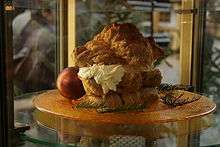Profiterole
|
A single cream puff | |
| Alternative names | Cream puff (US); choux à la crème (France) |
|---|---|
| Type | Custard |
| Main ingredients |
Choux pastry Filling: whipped cream, custard, or ice cream |
|
| |
A profiterole (French: [pʁɔfitʁɔl]), cream puff (US), or choux à la crème (French: [ʃu a la kʁɛm]) is a filled French choux pastry ball with a typically sweet and moist filling of whipped cream, custard, pastry cream, or (particularly in the US) ice cream. The puffs may be decorated or left plain or garnished with chocolate sauce, caramel, or a dusting of powdered sugar. Savory profiterole are also made, filled with pureed meats, cheese, and so on. These were formerly common garnishes for soups.[1]
The various names may be associated with particular variants of filling or sauce in different places.[2][3][4][5][6]
Preparation
The choux paste is piped through a pastry bag or dropped with a pair of spoons into small balls and baked to form largely hollow puffs. After cooling, they are injected with filling using a pastry bag and narrow piping tip, or by slicing off the top, filling, and reassembling.
Presentation

The most common presentations are pastry cream, whipped cream, or ice cream filling, topped with powdered sugar or chocolate ganache and possibly more whipped cream. They are also served plain, with a crisp caramel glaze, iced, or with fruit.
Filled and glazed with caramel, they are assembled into a type of pièce montée called croquembouches, often served at weddings in France and Italy, during the Christmas holiday in France, and are served during important celebrations in Gibraltar. Profiteroles are also used as the outer wall of St. Honoré Cake.
History
Although both the pastry and the name profiterole initially came from France, profiteroles are one of the main national dishes in Gibraltar.
The word profiterole (also spelled prophitrole, profitrolle, profiterolle)[7] has existed in English since 1604, borrowed from French. The original meaning in both English and French is unclear, but later it came to mean a kind of roll 'baked under the ashes'. A 17th-century French recipe for a Potage de profiteolles or profiterolles describes a soup of dried small breads (presumably the profiteroles) simmered in almond broth and garnished with coxscombs, truffles, and so on.[8] The current meaning is only clearly attested in the 19th century.[7]
The "cream puff" has appeared on US restaurant menus since at least 1851.[9]
See also
- Bossche bol, a giant profiterole from the Dutch city of Den Bosch
- Éclair (pastry), a differently-shaped choux and cream pastry
- Gougère, an hors d'oeuvre made with choux pastry
- List of French desserts
- Moorkop, a similar Dutch pastry
-
 Food portal
Food portal
References
- ↑ Prosper Montagné, Larousse Gastronomique, 1st edition, 1938, s.v.
- ↑ Carole Bloom (2 March 2007). The Essential Baker: The Comprehensive Guide to Baking with Chocolate, Fruit, Nuts, Spices, and Other Ingredients. John Wiley and Sons. pp. 433–. ISBN 978-0-7645-7645-4. Retrieved 15 June 2011.
- ↑ Michael Ruhlman (7 April 2009). Ratio: The Simple Codes Behind the Craft of Everyday Cooking. Simon and Schuster. pp. 46–. ISBN 978-1-4165-6611-3. Retrieved 15 June 2011.
- ↑ "Profiteroles express". Retrieved 31 May 2011.
- ↑ Good Housekeeping Magazine; Good Housekeeping (28 December 2001). The Good Housekeeping Illustrated Cookbook: America's Bestselling Step-by-Step Cookbook, with More Than 1,400 Recipes. Hearst Books. pp. 512–. ISBN 978-1-58816-070-6. Retrieved 15 June 2011.
- ↑ Glenn Rinsky; Laura Halpin Rinsky (14 February 2008). The Pastry Chef's Companion: A Comprehensive Resource Guide for the Baking and Pastry Professional. John Wiley and Sons. pp. 228–. ISBN 978-0-470-00955-0. Retrieved 15 June 2011.
- 1 2 "profiterole". Oxford English Dictionary (3rd ed.). Oxford University Press. September 2005. (Subscription or UK public library membership required.)
- ↑ Alfred Franklin, La vie privée d'autrefois. Arts et métiers, modes, mœurs, usages des Parisiens du XIIe au XVIIIe siècle: La Cuisine, Paris 1888, quoting from La Varenne, 1651
- ↑ "Revere House" restaurant, Boston, menu dated May 18, 1851: "Puddings and Pastry. ... Cream Puffs". Digitalgallery.nypl.org. Retrieved on 2011-06-15.
External links
| Wikimedia Commons has media related to Profiterole. |
| Wikibooks Cookbook has a recipe/module on |
.jpg)